Euronews Green brings you the latest updates from the UN climate conference in Baku, Azerbaijan.
Follow along with our live coverage of COP29 here. From our team at home and in Baku we'll be sharing the biggest news from day seven of the UN climate summit.

 ${title}
${title}
Live ended
That’s all from us from Baku today, thanks for following along. Here’s a quick recap of day seven.
- As the second week of the summit got underway, UN climate chief Simon Stiell delivered some stern words to delegates, and urged them to find common ground in the drive to secure a new climate finance agreement.
- Youth delegates rallied world leaders too, on Children and Youth Day. “Children around the globe face unique struggles because of climate change, but we also have unique solutions to tackle it,” one 14-year-old girl from Pakistan told the conference.
- COP-watchers have been keeping one eye on the G20 summit in Brazil, which kicked off today, and could raise ambition on the finance outcome.
- COP29 president Mukhtar Babayev said there is a wide range of options still on the table regarding the structure, contributors list and size of the planned financing package. “I think these discussions will continue until the last day,” he said. “Today we are not ready to talk about any numbers.”
EU says China could contribute to climate finance on a voluntary basis
The European Union made clear ahead of the COP that it wants to see countries like China and some Gulf states, stepping up to the plate. Their economies have boomed since the climate talks in the 1990s and China is now the world's biggest annual greenhouse gas emitter.
“Public finance should remain at the core of the NCQG,” the EU’s lead negotiator said, asserting that the bloc has always paid more than its fair share of the global total.
“With affluence comes responsibility,” climate commissioner Wopke Hoekstra told reporters in Baku after the week’s first round of talks.
But the EU has apparently conceded that it will not make any binding commitments.
“A potential solution could be to…move into a space of voluntary contributions,” he said. “We would be welcoming and open to those countries who do take such a step – in the end, this is not about dogmatism.”
Asked if the EU position is now that all contributions could be voluntary – including from those wealthy countries currently bound to a combined $100 billion (€95 billion) a year financing goal - he said only that the EU would “continue to stick with [its] commitments.”
The voluntary system would allow states whose wealth now outstrips that of many EU members to contribute while continuing to identify as developing countries if they “find it difficult to leave that category officially”.
Even assuming a significant boost in finance provision, Hoekstra recognised that private sector investment would be essential, and the final package must include incentives,
“The reality is that there will never, ever be enough public money – from any source,” he added. “We are here to design a system that reflects these realities.”
COP29: ‘Cut the theatrics’ over finance talks, UN climate chief warns
The whole COP climate process could stall or go into reverse if governments refuse to compromise with less than a week of negotiations left.
Finland and South Korea are in climate campaigners’ bad books
Every day at climate COPs, Climate Action Network International (CAN) announces an award no country wants to win: Fossil of the Day.
Today that award goes to South Korea. CAN explains:
“South Korea is currently blocking the long overdue deal for OECD countries to end their $41 billion in annual subsidies for oil and gas from export credit agencies. A leaked government document in September showed how the government is taking an unconstructive negotiating position. The EU, Canada, UK, Norway, Australia, and New Zealand are now all in favour of a deal. South Korea’s last hope of someone to hide behind, the US, also seems to be shifting in favour of a deal.”
Finland gets a ‘dishonourable mention’ for also falling foul of the campaigners’ climate finance standards. They claim the country is making cuts in the hundreds of millions and covering this up by fudging their numbers, by counting market-based loans as climate finance.
This is the Finance COP. Therefore, today’s Fossil award goes to a country that has its finance all backwards, South Korea🇰🇷 with dishonourable mention for Finland🇫🇮#PayUp #ClimateFinance
— Climate Action Network International (CAN) (@CANIntl) November 18, 2024
Press release - https://t.co/DtkJZxwwBT pic.twitter.com/6mW1YFdk54
Trump makes climate change sceptic his energy secretary
The election of Donald Trump as the next US president has cast a shadow over the climate talks, as he has again vowed to take the world’s second-biggest emitter out of the Paris Agreement.
In a newly dispiriting sign of his approach to climate change, Trump has selected Chris Wright, a fossil fuel executive, to serve as energy secretary in his administration next year.
CEO of Denver-based Liberty Energy, Wright is a vocal advocate of oil and gas development, including fracking, a key pillar of Trump’s quest to achieve US “energy dominance” in the global market.
Wright has been one of the industry’s loudest voices against efforts to fight climate change and could give fossil fuels a boost, including quick action to end a year-long pause on fossil gas export approvals by the Biden administration.
Trump names fossil fuel executive Chris Wright as energy secretary
Fracking advocate Chris Wright has been one of the industry’s loudest voices against efforts to fight climate change and could give fossil fuels a boost.
Climate cash is still a sticking point
Countries are still far from agreeing how much money climate mitigation, adaptation and loss and damage compensation will require - the overarching aim of COP29.
A group of developing nations last week put the sum at $1.3 trillion, while rich countries are yet to name a figure, the Associated Press (AP) reports. Several experts estimated that the money needed for climate finance is around $1 trillion.
“We all know it is never easy in politics and in international politics to talk about money, but the cost of action today is, as a matter of fact, much lower than the cost of inaction,” said Wopke Hoekstra, the EU climate commissioner at a press conference.
“We will continue to lead to do our fair share and even more than our fair share, as we’ve always done,” he said. But Hoekstra added that “others have a responsibility to contribute based on their emissions and based on their economic growth too.”
Teresa Anderson, the Global Lead on Climate Justice at ActionAid International, was sceptical about rich countries’ intentions:
“The concern is that the pressure to add developing countries to the list of contributors is not, in fact, about raising more money for frontline countries,” Anderson said. “Rich countries are just trying to point the finger and have an excuse to provide less finance. That’s not the way to address runaway climate breakdown, and is a distraction from the real issues at stake.”
Rachel Cleetus from the Union of Concerned Scientists said $1 trillion in global climate funds “is going to look like a bargain five, 10 years from now.”
“We’re going to wonder why we didn’t take that and run with it,” she said, citing a multitude of costly recent extreme weather events from flooding in Spain to hurricanes Helene and Milton in the US.
Got a question about climate change or Europe’s response?
A special edition of Euronews’s Climate Now Live show will dive into the latest findings from the Copernicus Climate Change Service, exploring the how and why behind climate impacts.
What does the data tell us, and how should Europeans prepare for the future?
Carlo Buontempo, Director of the Copernicus Climate Change Service will join Euronews' Science Correspondent Jeremy Wilks on 19 November to answer your questions about our warming planet. Let us know if you have one via the article below.
Hottest day, year, decade: How is Europe facing the climate crisis?
2024 has shattered records: the hottest day, the hottest year, and the warmest decade ever. Join us live from our headquarters in Brussels on 19 November to as…
Another protest inside Baku Stadium caught Euronews reporter Robert Hodgson’s eye this morning.
We have heard growing calls for a nuclear revival, and political and financial support on both sides of the Atlantic for small modular reactors - a fledging technology whose backers say could allow for quick deployment of carbon-free power where needed.
But NGOs are sceptical, and at the second protest on the way into the COP venue this morning, some of them told us why.
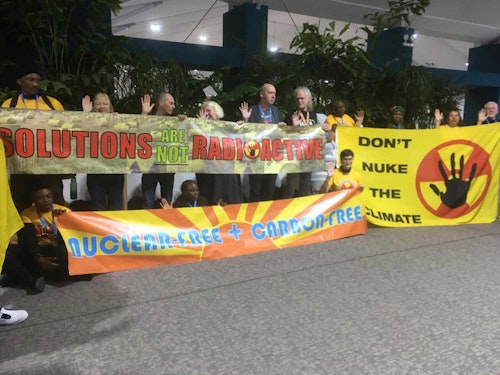
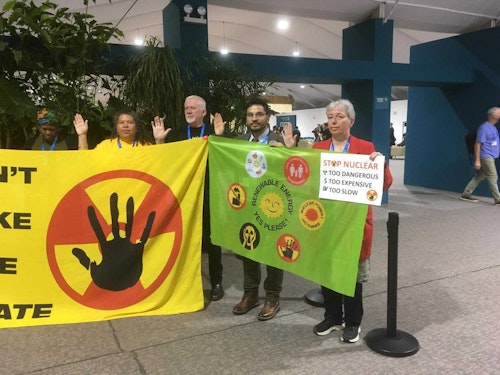
Credit: Robert Hodgson/Euronews
Children make impassioned pleas to leaders
Children took to the stage at COP earlier today, with powerful messages about climate impacts in their home countries and why - in the words of one young speaker - it is their right to be heard.
Zunaira, a 14-year-old climate activist from Pakistan, was among the UNICEF youth advocates holding a press conference inside the Blue Zone.
“Where I come from, climate disasters like floods and heatwaves aren't rare, they're a part of life. Floods disturb everything, our education, our safety, our security, and most particularly, our futures,” she said.
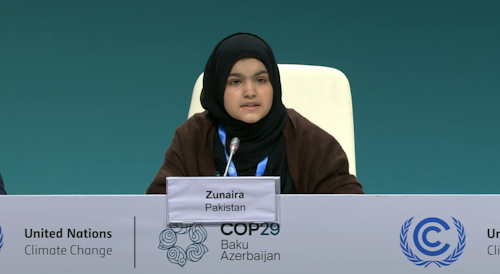
Zunaira, 14, from Pakistan, told a press briefing about the heavy toll that the climate crisis is taking on girls’ education. Credit: COP29 live feed
“When communities are hit by floods, resources become limited, and girls in particular, are impacted by the limited resources in the family. They are not their priority. They are forced to miss school. The family simply cannot afford this education in the times of crisis.
“Children around the globe face unique struggles because of climate change, but we also have unique solutions to tackle it. We bring fresh ideas, our energy and the perspective of living through these challenges every day. I truly believe that we make a difference.”
Ketsia, another young speaker from the Democratic Republic of the Congo, stressed that COP shouldn’t turn into a “flashy event.”
“Each COP has the potential to change the lives of thousands of people around the world for the better,” she added.
‘Let's get down to real business,’ says UN climate chief
UN Climate Change executive secretary Simon Stiell used his week 2 opening speech to urge countries to find common ground and up the pace.
“Dear colleagues, I urge you, wrap up less contentious issues as early as possible this week, so there is enough time for the major political decisions.
“We've worked closely with the Presidency, who have just laid out a clear approach to get us to the finish line.
“We can’t lose sight of the forest because we’re tussling over individual trees. Nor can we afford an outbreak of 'you-first-ism'. Where groups of parties dig in and refuse to move on one issue, until others move elsewhere,” he told the opening plenary.
“Bluffing, brinksmanship, and pre-mediated playbooks burn up precious time and run down the goodwill needed for an ambitious package.
“So let's cut the theatrics and get down to real business.”
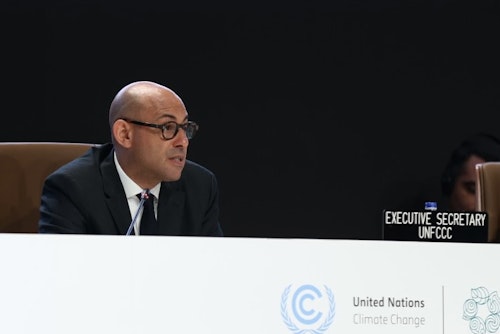
Simon Stiell addressed the joint COP/CMP/CMA plenary this morning. Credit: UN Climate Change/Kiara Worth
Beyond Baku, it’s not only the G20 that could influence the finance outcome
Protests at COP29 have been sparse and low-key, but attendees were welcomed by two on the way in this morning, including one linked to climate finance.
OECD export credit agencies are meeting in Paris today to discuss extending a ban on support for coal projects to cover oil and gas as well. The agencies help domestic companies access foreign markets by providing support such as finance, loan guarantees and insurance.
“Almost ten years ago, at the end of Obama's term, right before Trump took office, notably, the OECD agreed to stop financing coal projects,” says Collin Rees, a campaigner with Oil Change International.
“And it was Trump-proof,” Rees tells Euronews. “It took billions of dollars off the table for coal projects overseas, and now there's a lot of momentum to do the same for public finance for oil and gas.”
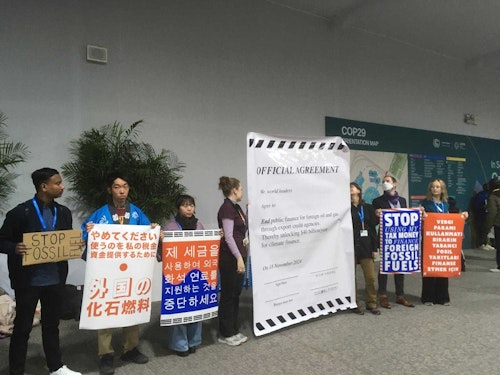
An OECD export credit protest at COP29. Credit: Robert Hodgson/Euronews
As well as encouraging Joe Biden to clinch another Trump-proof climate deal before he hands over the keys to the White House, the protestors are targeting three countries they see as most resistant to extending the export credit ban: South Korea, Japan, and Turkey.
A deal to broaden the restriction from coal to oil and gas would take some $41 billion (€38.8bn) away from the fossil fuel industry, the protestors estimate.
With the issue of ramping up finance for developing countries the focus of political negotiations this week, the connection is clear.
“We're hearing a lot here at the COP about how rich countries don't think they have the money,” Rees said. “There's no shortage of public money. There's a lack of political will.”
What bearing could the G20 summit have on COP29?
While talks continue in Baku, across the world in Rio de Janeiro world leaders are gathering for the G20 summit.
Climate change will be on the agenda, among other major topics like rising global tensions and poverty.
Harjeet Singh, global engagement director for the Fossil Fuel Non-Proliferation Treaty Initiative, says that G20 nations “cannot turn their backs on the reality of their historical emissions and the responsibility that comes with it.”
"They must commit to trillions in public finance," he tells the AP news agency.
In a written statement on Friday, UNFCCC executive secretary Simon Stiell said “the global climate crisis should be order of business Number One” at the G20 meetings, which run from 18 to 19 November.
Stiell noted that progress on stopping more warming should happen both in and out of climate talks, calling the G20's role “mission-critical.”
Frustration is rising
Half way through COP, observers have been disappointed at the slow pace of progress so far.
“This has been the worst first week of a COP in my 15 years of attending this summit,” Mohamed Adow, of climate think tank Power Shift Africa, said on Saturday. "There’s no clarity on the climate finance goal, the quality of the finance or how it’s going to be made accessible to vulnerable countries.”
“I sense a lot of frustration, especially among the developing country blocks here,” he said.
Frustration rises as COP29 climate summit enters it last week
The COP29 climate summit is midway through now and negotiators are trying to hammer out a deal that might be worth hundreds of billions of dollars. #EuropeNews
Good morning and welcome to our live COP29 coverage, as the summit heads into its second crucial week.
Negotiators are back after a rest day yesterday - and hopefully feeling refreshed given the amount of progress still to make on securing a climate finance deal.
We'll be here keeping you up to date with what's happening in Baku today so stay tuned.
And catch up on the action from Saturday here, when climate justice campaigners held a muted protest inside the venue.
COP29: Activists gather as progress on finance target slows
Euronews Green brings you the latest updates from the UN climate conference in Baku, Azerbaijan.











